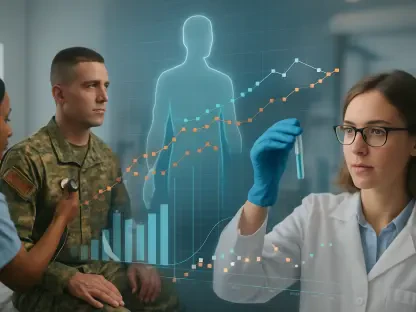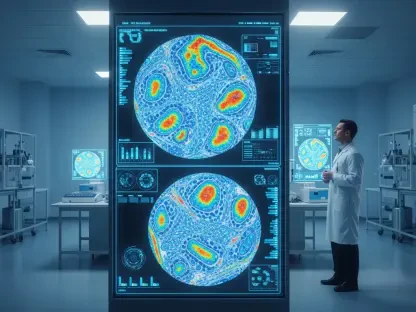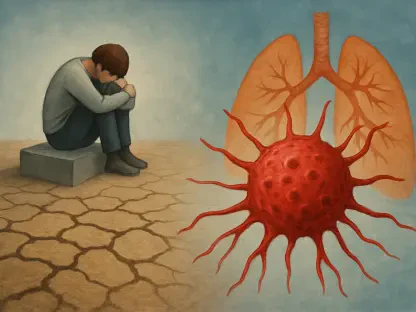Imagine a scenario where a newborn in Qatar is screened for life-threatening genetic conditions before even leaving the hospital, with results so accurate that families can avoid years of uncertainty and distress. This is no longer a distant dream but a reality through the BeginNGS program, a pioneering initiative launched through an international partnership between Rady Children’s Institute for Genomic Medicine (RCIGM) and Sidra Medicine. Announced on August 19, this collaboration positions Qatar as a leader in neonatal care in the Middle East, marking the first global expansion of a program designed to revolutionize how serious childhood diseases are detected and managed. BeginNGS, pronounced “beginnings,” harnesses next-generation sequencing (NGS) technology to identify over 500 severe pediatric conditions at birth, slashing false positives by an impressive 97% compared to traditional methods. This precision offers clarity to families and paves the way for early interventions that can prevent lifelong disabilities or even save lives. Beyond individual impact, the program embodies a vision of global health equity, ensuring that cutting-edge genomic tools reach children regardless of their location. With Sidra Medicine as a regional hub, Qatar is at the forefront of adapting this technology to the unique genetic makeup of the Middle East, addressing local challenges while contributing to a broader mission of transforming pediatric healthcare worldwide.
The Urgency of Early Detection
Tackling the Diagnostic Odyssey
The journey to diagnose rare genetic disorders in children often spans an agonizing average of five years, a delay that can result in worsening health conditions or irreversible damage before appropriate care begins. BeginNGS steps in as a transformative solution by utilizing advanced NGS technology to screen newborns for over 500 critical conditions right at birth. Experts at Sidra Medicine have emphasized that such early detection can drastically alter a child’s health trajectory, enabling interventions like specialized diets or medical treatments before symptoms even manifest. This rapid identification cuts through the prolonged uncertainty that many families face, replacing guesswork with actionable insights. By integrating genomic screening into routine neonatal care, the program ensures that healthcare providers can act swiftly, potentially preventing developmental delays or life-threatening complications that might otherwise go unnoticed for years.
Another dimension of this urgency lies in the emotional and financial toll of delayed diagnoses on families, who often face significant challenges during this difficult time. When answers are postponed, parents endure countless medical consultations, invasive tests, and mounting costs, all while grappling with the fear of the unknown. BeginNGS mitigates these burdens by delivering precise results early on, minimizing unnecessary follow-ups and allowing resources to be directed toward effective care. The impact is particularly profound in regions like Qatar, where access to specialized diagnostics has historically been limited for some. This initiative not only addresses medical needs but also brings a sense of relief and empowerment to families, equipping them with the knowledge to make informed decisions about their child’s future from the very start.
Reducing False Positives for Peace of Mind
Traditional newborn screening methods frequently raise false alarms, causing undue stress for families as they navigate a maze of additional testing to confirm or rule out a diagnosis. BeginNGS redefines this experience by achieving a remarkable 97% reduction in false positives, a statistic backed by research published in The American Journal of Human Genetics. This unparalleled accuracy means that when a condition is flagged, healthcare providers and families can trust the results, focusing their energy on genuine health concerns rather than chasing misleading signals. In a setting like Qatar, where cultural and emotional responses to medical uncertainty can be significant, this reliability offers a profound sense of reassurance, ensuring that only those who truly need intervention are identified promptly.
Moreover, the reduction in false positives translates into a more efficient allocation of medical resources within healthcare systems. Unnecessary tests and specialist referrals often strain hospital capacities and inflate costs, diverting attention from patients with confirmed needs. By streamlining the diagnostic process, BeginNGS allows Sidra Medicine to optimize its workflow, ensuring that staff and equipment are utilized effectively. This efficiency is critical in a region aiming to scale up advanced neonatal care, as it builds trust in the system and encourages broader adoption of genomic screening. Families benefit from a clearer path forward, while healthcare providers can maintain focus on delivering high-quality, targeted interventions without the burden of redundant procedures.
Technological Innovation in Neonatal Care
Power of Next-Generation Sequencing
At the heart of BeginNGS lies the remarkable capability of next-generation sequencing, a technology that performs massively parallel sequencing to analyze vast amounts of genetic data with unprecedented speed and precision. This approach enables the detection of rare monogenic disorders in newborns by scanning for specific mutations across hundreds of conditions in a single test at Sidra Medicine. Sophisticated algorithms for variant calling, paired with rigorous clinical validation, ensure that results are not only fast but also highly accurate. The integration of high-throughput sequencing systems and cloud-based data processing further enhances scalability, allowing hospitals to incorporate genomic insights directly into everyday clinical workflows. This technological backbone positions BeginNGS as a cornerstone of modern neonatal care, transforming how genetic diseases are identified and managed from the earliest days of life.
The significance of this technology extends beyond mere detection to the broader implications for healthcare delivery in regions like Qatar. By automating and accelerating the analysis of complex genetic information, BeginNGS reduces the dependency on specialized geneticists for initial screenings, making the process more accessible even in areas with limited expertise. Real-time data integration means that results can inform medical decisions almost immediately after birth, a critical factor when time-sensitive interventions are needed. This seamless operation sets a new benchmark for efficiency, demonstrating how cutting-edge tools can bridge gaps in traditional healthcare systems and bring world-class diagnostics to diverse populations with varying levels of infrastructure support.
Pioneering Preventive Healthcare
BeginNGS goes a step further than traditional diagnostics by incorporating polygenic risk scoring, an innovative method to assess the likelihood of complex conditions such as type 1 diabetes long before symptoms emerge. This approach analyzes multiple genetic markers to provide a comprehensive risk profile, enabling healthcare providers at Sidra Medicine to recommend preventive measures like lifestyle adjustments or early therapeutic strategies. By identifying potential health challenges at birth, the program shifts the focus from reacting to illness to proactively managing risks, a paradigm shift that could redefine pediatric care. This preventive model empowers families with knowledge to make informed choices, potentially averting chronic conditions that would otherwise burden both the child and the healthcare system in the long term.
Additionally, the emphasis on prevention through BeginNGS highlights a forward-thinking strategy that aligns with global trends in precision medicine. Unlike older screening methods that target only immediate and evident disorders, this technology anticipates future health issues, allowing for tailored monitoring or early interventions that can mitigate severity. For a region like the Middle East, where certain genetic predispositions to complex diseases are more prevalent, this capability is invaluable. It ensures that neonatal care evolves from a one-size-fits-all approach to a personalized framework, where each child’s unique genetic blueprint informs their health journey from infancy onward, setting a foundation for lifelong well-being.
Customizing Care for Qatar’s Population
Addressing Unique Genetic Profile
The genetic landscape of Qatar presents distinct challenges due to high rates of consanguinity and the presence of specific founder mutations, which can complicate standard diagnostic approaches for rare diseases. BeginNGS tackles this by tailoring its screening protocols and bioinformatics algorithms to reflect the local population’s unique genetic patterns, ensuring that results are both accurate and relevant for Qatari families. This customization, driven by Sidra Medicine’s research expertise, enhances the detection of conditions that might be missed by generic screening tools, offering a level of precision that is critical for effective interventions. Furthermore, the data generated through these adapted screenings contribute to a richer global understanding of genetic diversity, helping refine diagnostic tools for other populations with similar genetic characteristics.
This localized approach also addresses cultural and medical nuances that influence healthcare delivery in the region, ensuring that screening methods align with Qatar’s specific needs. By doing so, BeginNGS ensures that diagnoses resonate with the lived experiences of families, fostering trust in the medical system. The program’s ability to interpret genetic variants in the context of regional prevalence rates means that healthcare providers can offer more targeted counseling and treatment plans. This not only improves clinical outcomes but also strengthens community engagement with advanced medical technologies, as families see direct relevance in the care provided. Such personalization is a vital step toward making genomic medicine a practical reality in diverse settings, where one-size-fits-all solutions often fall short.
Building a Regional Hub
Sidra Medicine’s role extends beyond implementing BeginNGS to establishing itself as a pioneering hub for genomic screening across the Middle East, leveraging the expertise of RCIGM to adapt and enhance the program. This regional focus involves refining screening panels to account for genetic variations prevalent in neighboring countries, thereby creating a model that can be replicated across diverse landscapes. The collaboration aims to deepen the understanding of rare disease prevalence in populations with shared genetic histories, ensuring that interventions are culturally and medically appropriate. By serving as a center of excellence, Sidra Medicine sets a precedent for how advanced diagnostics can be integrated into regional healthcare systems, amplifying the impact of BeginNGS far beyond Qatar’s borders.
Equally important is the hub’s contribution to capacity building and knowledge sharing within the Middle East. Through this initiative, local healthcare professionals gain access to training and resources in genomic medicine, fostering a sustainable ecosystem of expertise that can support long-term advancements in neonatal care. The emphasis on regional diversity in genetic data also aids in developing more inclusive global screening standards, as insights from Qatar inform broader research efforts. This strategic positioning not only elevates the standard of care locally but also establishes a collaborative network that can address shared health challenges, making Sidra Medicine a linchpin in the region’s journey toward precision medicine.
Commitment to Health Equity
Breaking Down Barriers to Care
Rare genetic diseases often disproportionately impact communities with limited access to advanced diagnostics, leaving many families to endure prolonged delays in identifying and treating conditions. BeginNGS confronts this disparity head-on by significantly shortening diagnostic timelines, ensuring that newborns in Qatar receive swift identification of severe conditions and access to targeted treatments. This initiative, spearheaded by Sidra Medicine, aligns with a broader mission to level the playing field in healthcare, particularly in a region where systemic challenges can hinder timely medical intervention. By bringing cutting-edge genomic tools to the forefront of neonatal care, the program addresses inequities that have long affected vulnerable populations, offering hope where uncertainty once prevailed.
The ripple effects of this commitment to equity are felt beyond individual diagnoses, influencing the structure of healthcare delivery itself. BeginNGS reduces the need for families to seek specialized care abroad, a costly and often inaccessible option for many, by embedding world-class diagnostics within local systems. This accessibility ensures that economic or geographic barriers do not dictate a child’s chance at a healthy start. Moreover, by prioritizing rapid and accurate results, the program alleviates the emotional strain of prolonged medical uncertainty, a burden that disproportionately affects underserved groups. Such efforts underscore a profound ethical stance: that every child deserves the best possible beginning, regardless of circumstance.
A Vision for Global Reach
The ethical foundation of BeginNGS is rooted in a vision of inclusivity, aiming to ensure that no child is denied access to life-saving genomic interventions due to geographic or economic constraints. With an ambitious goal to screen for 1,000 childhood diseases across at least 10 countries by 2030, the program seeks to create a replicable model of neonatal care that transcends borders. Qatar’s participation marks a crucial first step in this global mission, demonstrating how international partnerships can bring advanced technologies to diverse regions. This expansion prioritizes adapting to local regulations and cultural contexts, ensuring that the benefits of precision medicine are universally accessible while respecting regional differences.
This global outlook also emphasizes the importance of building a collaborative framework that can address disparities on a worldwide scale. By sharing expertise, data, and resources through initiatives like the BeginNGS Consortium, the program fosters a network of healthcare systems united by a common goal of equity. The focus on scalability means that lessons learned in Qatar can inform implementations elsewhere, creating a blueprint for integrating genomic screening into varied environments. This vision not only amplifies the reach of cutting-edge diagnostics but also reinforces the principle that health equity is a shared responsibility, requiring coordinated efforts to ensure that every newborn, everywhere, has the opportunity for early detection and care.
Collaborative Power and Scalability
Strength in Partnership
The alliance between RCIGM and Sidra Medicine exemplifies the power of collaboration, combining deep expertise in genomic screening with robust regional healthcare infrastructure to bring BeginNGS to life in Qatar. This partnership is further strengthened by the BeginNGS Consortium, a coalition of leaders from healthcare, biotechnology, and technology sectors, all working to create a cohesive framework for neonatal genomics. Together, they address complex challenges like regulatory alignment and cultural adaptation, ensuring that the program fits seamlessly into local systems. The emphasis on secure, interoperable data-sharing networks also safeguards patient privacy while enabling the collective advancement of rare disease research, highlighting a model of teamwork that prioritizes both innovation and responsibility.
Beyond technical integration, this collaboration fosters a shared commitment to improving pediatric outcomes through mutual learning and resource pooling. Sidra Medicine benefits from RCIGM’s pioneering experience in newborn screening, while RCIGM gains insights into the Middle East’s unique genetic and healthcare landscapes, enriching its global perspective. This synergy creates a dynamic platform for innovation, where best practices are exchanged and refined to suit diverse needs. Such partnerships set a standard for cross-border health initiatives, demonstrating how uniting varied expertise can tackle systemic challenges in medicine, ultimately benefiting children and families across different regions with tailored, high-impact solutions.
Expanding Horizons for Genomic Medicine
The scalability of BeginNGS lies in its adaptable design, crafted to integrate into varied healthcare systems while respecting local governance and ethical standards. This flexibility ensures that the program can expand beyond Qatar, with a roadmap to reach multiple countries by 2030, each implementation customized to address specific population health needs. The collaborative efforts behind BeginNGS prioritize building secure data ecosystems that facilitate global research without compromising individual privacy, a critical balance for widespread adoption. By establishing a replicable model, the initiative paves the way for genomic medicine to become a routine component of neonatal care worldwide, transforming how early health interventions are approached on a massive scale.
This focus on expansion also underscores the potential for BeginNGS to influence health policy and infrastructure development internationally. As the program scales, it provides valuable data on the efficacy and challenges of genomic screening in different contexts, informing strategies for resource allocation and training in emerging markets. The collaborative nature of the initiative ensures that technology transfer is accompanied by capacity building, empowering local healthcare providers to sustain and advance these efforts. Looking ahead, the success of this scalable model could inspire broader investments in precision medicine, ensuring that the benefits of early genetic screening reach even the most remote or underserved communities, reshaping the global landscape of pediatric healthcare for generations to come.









